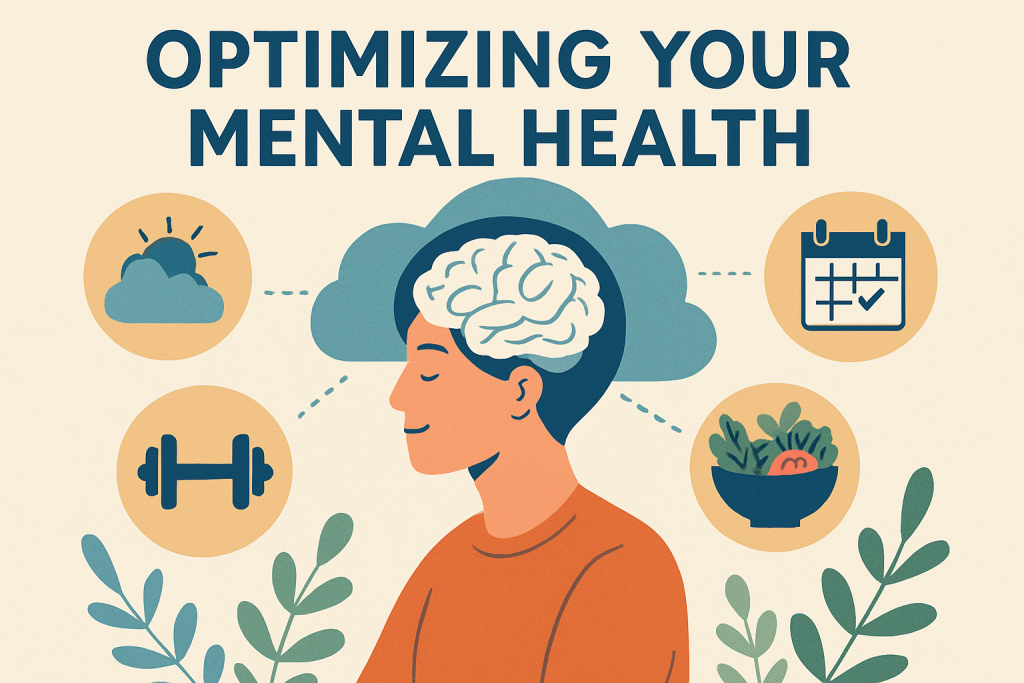As we approach World Mental Health Awareness Day this October, it’s essential to revisit ways to nurture and enhance our mental well-being. In 2025, with the ever-evolving landscape of mental health research and resources, there are innovative and effective strategies to optimize mental health. Here, we outline 12 ways to bolster your mental wellness, ensuring you’re equipped with the latest insights and practices.

1. Prioritize Regular Physical Activity
Exercise is a proven mood booster that can help alleviate symptoms of depression and anxiety. The National Institute of Mental Health (NIMH) highlights the importance of regular physical activity as a means to improve mood and overall mental health. Engaging in activities like walking, yoga, or cycling for at least 30 minutes a day can significantly enhance your mental well-being.
2. Practice Mindfulness and Meditation
Mindfulness and meditation have become integral to mental health strategies. Research from the National Institutes of Health (NIH) suggests that these practices can reduce stress and promote emotional health. Consider incorporating a daily meditation routine, even just five minutes, to center your thoughts and reduce stress.
3. Maintain a Balanced Diet
Nutrition plays a crucial role in mental health. A diet rich in fruits, vegetables, whole grains, and lean proteins supports brain health. The World Health Organization (WHO) emphasizes the importance of a balanced diet in maintaining mental well-being. Omega-3 fatty acids, found in fish and flaxseed, are particularly beneficial for brain health.
4. Get Adequate Sleep
Sleep is foundational to mental health. The Centers for Disease Control and Prevention (CDC) recommends 7-9 hours of sleep per night for adults to ensure optimal functioning. Poor sleep is linked to mental health issues such as depression and anxiety, making it vital to establish a consistent sleep routine.
5. Foster Strong Social Connections
Human connection is crucial for mental health. Engaging with friends, family, and community can provide emotional support and reduce feelings of isolation. The CDC notes that social connections can improve happiness and longevity.
6. Set Realistic Goals
Setting and achieving goals can provide a sense of accomplishment and purpose. However, it’s important to set realistic and attainable goals to avoid unnecessary stress. Break larger goals into smaller, manageable tasks to maintain motivation.
7. Limit Screen Time
With the digital age in full swing, managing screen time is more crucial than ever. Excessive screen time can lead to increased anxiety and depression. The American Academy of Pediatrics recommends setting boundaries around technology use to promote better mental health.
8. Seek Professional Help When Needed
Recognizing when to seek help is a sign of strength, not weakness. The NIMH advises reaching out to mental health professionals if you’re experiencing persistent mental health issues. Therapy and counseling can provide valuable tools and support.
9. Practice Gratitude
Gratitude practices have been shown to improve mood and mental health. Taking time each day to reflect on things you are thankful for can shift focus from negative to positive.
10. Stay Informed and Educated
Staying informed about mental health can empower you to make better decisions about your well-being. Engage with reputable sources such as the WHO and NIH to learn about the latest mental health research and recommendations.
11. Engage in Creative Activities
Creative expression can be therapeutic. Activities such as painting, writing, or playing music can reduce stress and improve mental clarity. The process of creating can be as beneficial as the final product.
12. Volunteer and Give Back
Volunteering can provide a sense of purpose and community. The CDC highlights that helping others can lead to increased happiness and reduced stress.
Conclusion
In 2025, taking proactive steps to optimize mental health is more important than ever. These strategies not only enhance personal well-being but also contribute to a more understanding and supportive community. At Luxury Rehab, we are committed to connecting individuals with the resources and support they need to thrive. As World Mental Health Awareness Day approaches, let’s commit to prioritizing mental health for ourselves and those around us.
References
- National Institute of Mental Health (NIMH)
- National Institutes of Health (NIH)
- World Health Organization (WHO)
- Centers for Disease Control and Prevention (CDC)




